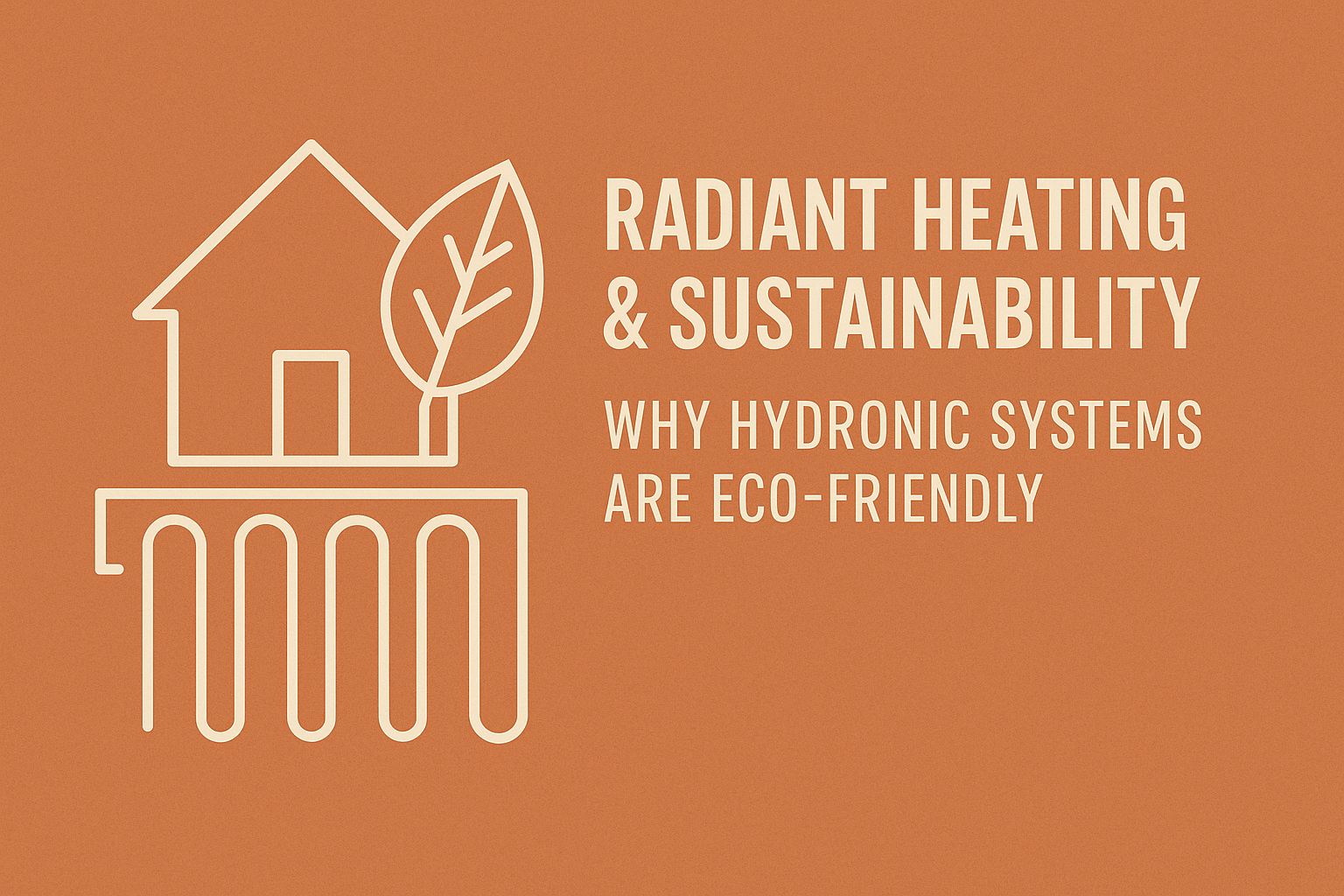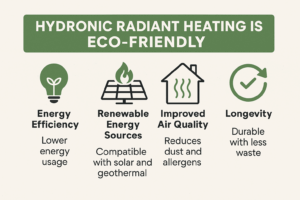Signs Your Radiant Heating System Needs Attention
Share this story: Facebook X LinkedIn Email Signs Your Radiant Heating System Needs Attention: Troubleshooting Tips and When to Call

Radiant Heating & Sustainability: Why Hydronic Systems Are Eco-Friendly

As sustainability and energy efficiency become top priorities for homeowners and builders alike, hydronic radiant heating has emerged as a popular, environmentally-friendly solution. But why exactly are hydronic radiant heating systems considered sustainable, and how can investing in one benefit both the environment and your wallet? Let’s dive in.
Why Hydronic Radiant Heating is Eco-Friendly
Hydronic radiant heating systems circulate warm water through tubing beneath your floors to evenly and efficiently warm your home. This water-based system naturally lends itself to energy efficiency and sustainability. Here’s how:
Unlike forced-air systems, hydronic heating doesn’t lose heat through air ducts or vents. Instead, it radiates heat directly from the floor, ensuring more of the heat generated actually reaches your living spaces. The result: lower energy usage and significantly reduced heating bills.
One of the most significant sustainability advantages of hydronic radiant heating is its seamless integration with renewable energy sources. Hydronic systems can easily be paired with:
These combinations further minimize your carbon footprint and reliance on fossil fuels, creating a truly eco-friendly heating solution.
Hydronic radiant heating eliminates the need for forced air circulation. Without ducts blowing air—and potentially dust and allergens—around your home, indoor air quality improves, creating a healthier living environment.
Hydronic systems have fewer mechanical parts and typically last significantly longer than conventional heating systems. The durability of these systems results in less waste, lower maintenance costs, and fewer replacements, further contributing to sustainability.
How FloorHeat Enhances Sustainability in Your Home
At FloorHeat, sustainability isn’t just a trend—it’s a core aspect of our radiant heating solutions. Our EasyFloor Hydronic Radiant Heating System is meticulously designed to maximize efficiency and eco-friendliness:
Choosing Sustainability with FloorHeat
Hydronic radiant heating systems are an excellent choice if you’re committed to sustainability, efficiency, and long-term environmental stewardship. With FloorHeat’s carefully engineered solutions, you’ll enjoy:
✅ Reduced Energy Consumption
✅ Lower Carbon Footprint
✅ Long-lasting Performance and Reliability
✅ Healthier Indoor Air Quality
Whether you’re constructing a new sustainable home, retrofitting your current space, or looking to upgrade to a more eco-friendly heating solution, FloorHeat has you covered.
Ready to explore sustainable, comfortable heating solutions?
Connect with FloorHeat today to learn more about integrating our eco-friendly radiant heating solutions into your next project.
Share this story: Facebook X LinkedIn Email Signs Your Radiant Heating System Needs Attention: Troubleshooting Tips and When to Call
Share this story: Facebook X LinkedIn Email Radiant Heating System Maintenance 101: Keep Your System Running Smoothly A radiant heating
Share this story: Facebook X LinkedIn Email Geothermal Boilers and Radiant Heating – A Perfect Match with FloorHeat EasyFloor
Share this story: Facebook X LinkedIn Email Choosing flooring for your radiant heating system involves balancing aesthetics, performance, and practicality.
Share this story: Facebook X LinkedIn Email Hydronic vs. Electric Radiant Heat – Which is Best for Your Home?
Share this story: Facebook X LinkedIn Email Compact Comfort: The Benefits of Radiant Heating for Tiny Homes & Small Spaces

